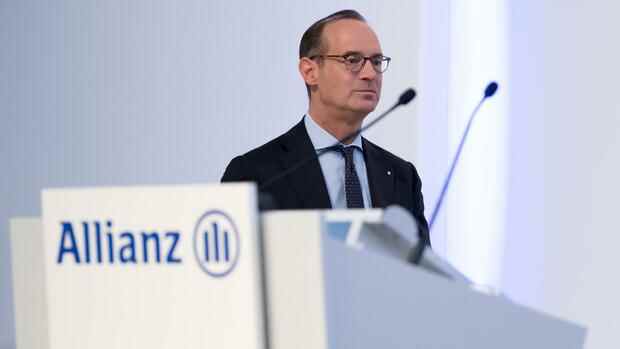Munich Allianz has taken another step forward in dealing with its hedge fund debacle in the USA. The Munich-based insurer announced a further provision of 1.9 billion euros on Wednesday before the start of the stock market, which will be booked for the first quarter. This will burden the quarterly surplus for the first quarter with 1.6 billion euros.
The surplus is thus only 600 million euros, the operating result is 3.2 billion euros. Analysts had previously expected an average of just over three billion euros. Allianz assumes that the further provision creates a realistic assessment of the remaining financial risk for compensation payments to investors and for a possible conclusion of the official investigations.
For around two years, Allianz has been fighting lawsuits from major American investors due to high losses from so-called structured alpha funds of the subsidiary AGI at the beginning of the corona crisis in March 2020. The highly speculative investment products had a volume of around 15 billion dollars at the time. Particularly loss-making funds were even liquidated at this time.
In mid-February this year, the group made a provision of 3.7 billion euros. This reduced net income for the past year by 2.8 billion euros. Even then it was said that it probably shouldn’t stay that way. With the new provisions of 1.9 billion, the total rises to 5.6 billion euros.
Top jobs of the day
Find the best jobs now and
be notified by email.
At the general meeting last week, there were signs of movement in the case. CEO Oliver Bäte spoke of a speedy and final agreement on the lawsuits and investigations, which he expects shortly. His board colleague Renate Wagner was even more specific.
Investor lawsuits are still pending
According to her, an agreement was reached with investors in February, for which about $3.5 billion in compensation was paid. In the weeks that followed, around another billion dollars were paid to plaintiffs. However, complaints from investors are still pending.
Even then it was clear that the originally called 3.7 billion euros in provisions would not be enough. Investors had already expected possible claims payments of six billion dollars last year. Analysts such as Werner Schirmer from Landesbank Baden-Württemberg (LBBW) used comparative figures from compensation payments that had already been made.
A particularly prominent plaintiff, the Arkansas Teachers’ Pension Fund (ATRS), received $643 million in a settlement with Allianz, and thus 83 percent of its claims.
ATRS, one of the largest investors in structured alpha funds, had invested $1.62 billion of its total fund assets of $18.3 billion in three structured alpha funds in early 2020, just prior to the outbreak of the pandemic. According to the “Institutional Investor” industry service, the losses would have destroyed a good five percent of the fund’s assets. Other prominent plaintiffs included the Milwaukee Employers Retires System (CMERS) pension schemes, the Teamsters union, and the New York Metro.
precedent for further lawsuits
The procedure at the Arkansas teachers’ pension fund was always considered to be decisive for the further proceedings. In the US judiciary, so-called precedents often set the direction that other plaintiffs can follow. Overall, there was no agreement with around 25 plaintiffs, whose investment in the highly speculative fund was mostly smaller than in the Arkansas teacher pension fund.
The plaintiffs accused Allianz of deviating from its contractually agreed strategy during the temporary panic that prevailed during the market turmoil at the beginning of the corona crisis. This caused the damage to be even greater.
The structured alpha funds, which were only sold to large American investors, promised stable returns and protection, even during market fluctuations, according to the US law firm Bernstein, Litowitz, Berger & Grossman (BLBG). However, the investigations of the law firm, which represents several plaintiffs, came to the conclusion that the fund managers of the Allianz subsidiary AGI had not adhered to this strategy.
In addition, the management of the structured alpha funds would have ignored the warnings of their in-house chief economist Mohamed El-Erian. He had already said at the beginning of February 2020 that the emerging pandemic would have a substantial impact on the market. However, according to the BLBG lawyers, the fund management did the opposite. It pursued the strategy of betting on falling volatility and rising share prices. When the opposite happened, the funds suffered massive losses.
Agreement with US authorities is still pending
According to Allianz, the provision, which has been increased to a total of 5.6 billion euros, should have created a realistic estimate of the total damage from compensation and penalties. Investors recently paid particular attention to the investigations by the US authorities into possible penalties.
Both the SEC and the US Department of Justice have been dealing intensively with the incidents in the highly speculative funds since last summer. The allegation of possible manipulation of the VIX volatility index, which played a key role in determining the fund’s value, is also at stake. Allianz wants to achieve a timely completion of the official procedures, both with the Ministry of Justice and with the SEC. As soon as there is an agreement, investors will be informed.
On the stock market, the Allianz share has been suffering from the uncertainty over the possible burdens from the hedge fund debacle in the USA for months. On Wednesday it opened up 2.5 percent at EUR 198.50. Allianz’s dividend policy should not be affected by the new provision. Here, the group plans to continue paying out 50 percent of the annual profit and at least an increase of five percent compared to the previous year’s dividend.
Just last week, analysts at the private bank Berenberg reported on their talks with major US investors in New York and Boston. They acted cautiously at Allianz until more clarity about the problems with the structured alpha funds became apparent. The coming days should now show whether they are satisfied with the negotiated result.
More: “How could you go so wrong?” – Shareholders sharply criticize Allianz
